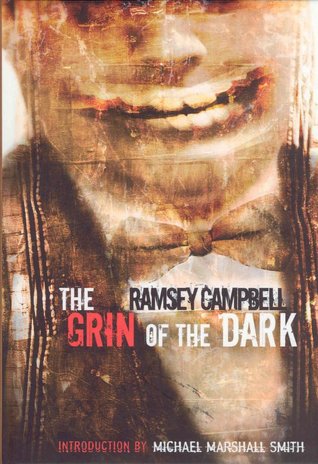By RAMSEY CAMPBELL (PS Publishing; 2007)
I’ve made no secret of the fact that I find Ramsey Campbell’s recent novels uninspiring. Campbell, of course, is Britain’s greatest living horror writer, but his best work in my view was done back in the seventies and eighties. While Campbell’s newer books SILENT CHILDREN, THE DARKEST PART OF THE WOODS and SECRET STORY were all solid works, none for me come close to matching the terror and brilliance of what came before, while THE PACT OF THE FATHERS and THE OVERNIGHT flat-out don’t work.
Thus I was doubly startled by THE GRIN OF THE DARK, easily Campbell’s finest book in years. It’s certainly the only one of his recent novels that can stand alongside early masterworks like THE FACE THAT MUST DIE, INCARNATE and THE COUNT OF ELEVEN—indeed, it may even surpass them. It amply demonstrates why Campbell is widely considered the absolute best at what he does: the man really knows how to scare, not via empty shock value but by inducing a far deeper, all-encompassing sense of psychological dread.
In the manner of most good horror tales, THE GRIN OF THE DARK sneaks up on the reader. It begins in amiable enough fashion, introducing its first person protagonist, laid-back film buff Simon Lester, with the ingratiating chapter heading “I’m Not a Loser” and an apparently sincere determination that “I’m going to take charge of my life.” Things certainly seem to be looking up for this even-tempered slacker when he’s assigned to write a book about Tubby Thackery, a forgotten silent film comedian.
The prose in this section, echoing the nature of the narrator, is among the most relaxed and confident of any Campbell book in recent memory, free of any trace of overwriting (as in THE OVERNIGHT) and the need to throw in a gratuitous cliffhanger at the end of every chapter (as in PACT OF THE FATHERS).
Several engagingly quirky characters are introduced, including Simon’s jovial editor Colin, Simon’s sweet wife Natalie, her precocious seven-year-old son Mark, her snooty parents Warren and Bebe, and “Smilemine”, a seemingly illiterate imdb message board poster with whom Simon gets into an epic tiff. And then there’s Tubby Thackery, a long-dead Fatty Arbuckle-esque personage whose presence seeps into Simon’s life in eerie ways, and always via Thackery’s signature grin, which has a way of turning up in the unlikeliest of places (and faces).
Much of the remainder of the book is concerned with Simon’s attempts at tracking down Thackery’s films, which prove to be extremely elusive—and contain a macabre history that only comes to light after it’s too late. In this respect the story is reminiscent of Campbell’s 1989 novel ANCIENT IMAGES, about the search for an elusive film with supernatural connections—that book, alas, was marred in my view by an underwhelming third act. You can rest assured Campbell doesn’t make the same mistake here.
In fact, the final hundred or so pages of THE GRIN OF THE DARK, in which poor Simon completely loses his mind and the horrific truth about Thackery’s films comes clear, contain some of the finest writing Campbell has ever done. Herein the creeping unease of the first two thirds explodes into outright horror, and Campbell, as is his custom, puts the reader firmly in the driver’s seat as total insanity overtakes the protagonist. I honestly can’t recall ever experiencing a more unnerving depiction of reality displacement then that presented here.
What gives the book its power is the ordinariness of its situations and surroundings. A bank is the setting for a particularly harrowing set piece—harrowing because what occurs there, involving an emptied-out account, could happen to any of us. It’s happened to me. I’m also familiar with the experience of an online war of words of the type Simon engages in with the pesky Smilemine, a running thread in this book that comes to take on increasingly horrific dimensions.
The internet, for its part, is paramount to Campbell’s story, as malignant a force in its way as the possibly supernatural specter of a long-dead comedian. Thus Campbell manages to unite the old and the new in a manner he’s never attempted before, while crafting one of the most profoundly disquieting tales he’s ever told. By the end of it the protagonist’s sanity is in tatters, and yours may very well be too!

